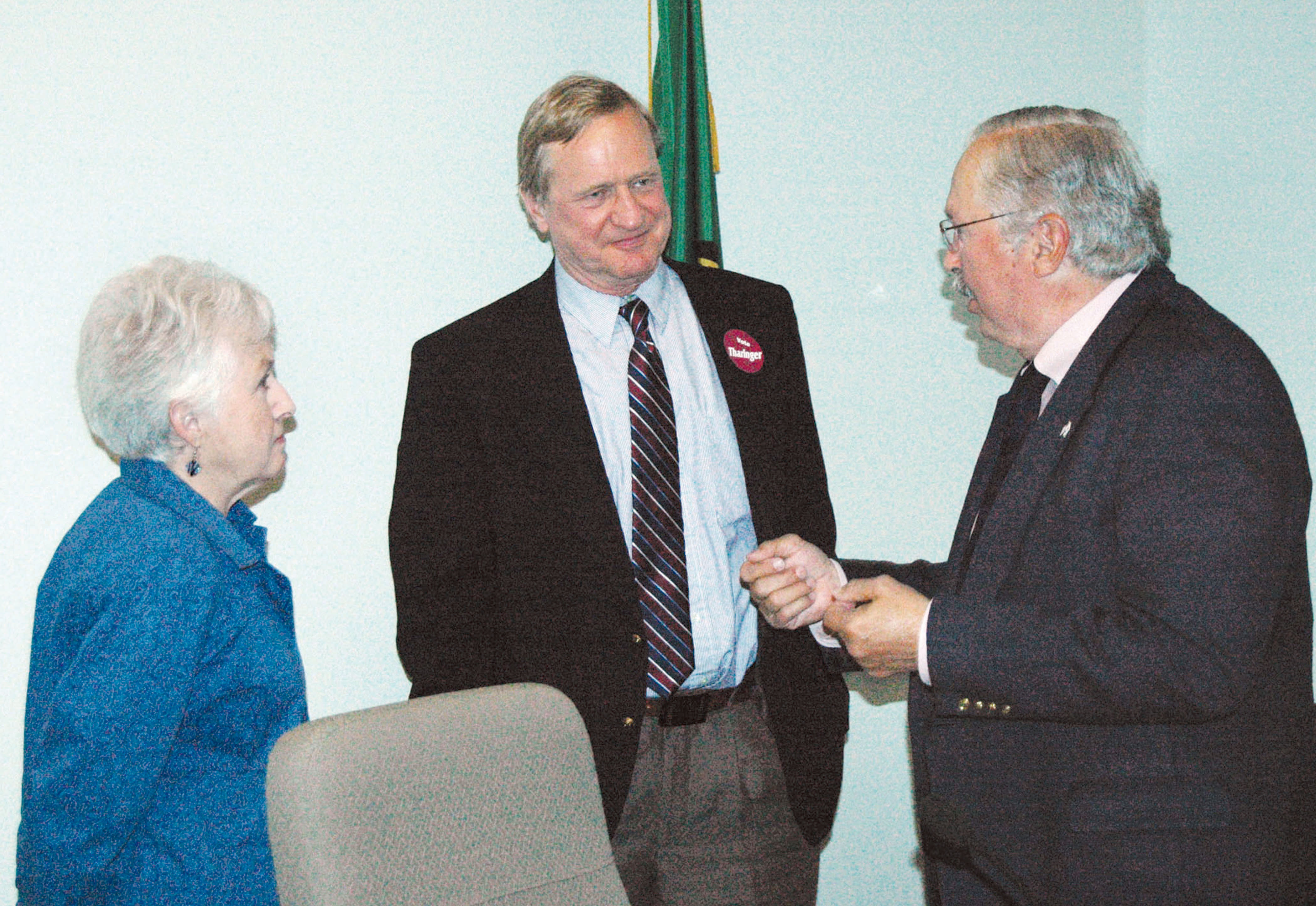SEQUIM — An incumbent state representative and his GOP challenger touched on an array of topics ranging from climate change to taxes to legalized marijuana during their appearance at a primary election forum.
Rep. Steve Tharinger, a Sequim Democrat, and Republican Thomas Greisamer of Moclips in Grays Harbor County attended the event for 24th District candidates Sunday, which was sponsored by the Clallam County League of Women Voters at the Sequim Transit Center.
Libertarian Stafford Conway of Sequim, the third candidate in the Aug. 5 primary, did not attend.
Conway, who said Monday that “I totally got my dates mixed,” said he will participate in a second League forum for 24th District candidates scheduled for 6 p.m. Wednesday at the Port Angeles Senior Center, 428 E. Seventh St.
The 24th District covers Clallam and Jefferson counties and about half of Grays Harbor County.
Ballots will be mailed out July 16 for the Aug. 5 primary. Election Day is on Nov. 4.
Tharinger, who will be 65 on Election Day, and Greisamer, a retired psychiatrist who will be 73, drew distinctions between themselves immediately during the 70-minute forum, which was attended by about 35 people and moderated by Vicci Rudin of the League of Women Voters.
In his opening statement, Tharinger recounted his multiple terms as a member of the Clallam County Board of Commissioners and Planning Commission and took issue with the notion that unlike other professions, experience does not seem to count to some voters when it comes to politics.
“The issues you face as a legislator are complex,” said Tharinger, running for his third two-year term in the state House.
“Look at my record, and look at what I’ve done for the district as a local county commissioner and then as a legislator. I think that experience matters.”
Greisamer noted in his opening statement that his personal experience made him “not favorably inclined toward abortion.”
He also said that as a legislator he wants to address “the disconnect” between those running the government and those working and paying taxes.
“There’s just too many regulations, and it’s hard to do business,” he said.
“What I would like to do is lower the barriers to competition and lower the barriers toward doing business.”
The status of legalized recreational marijuana in Washington state was among the topics raised by seven members of the audience asking questions of the candidates.
Tharinger and Greisamer both criticized voter-approved Initiative 502, the provisions of which are still being hammered out by state officials and dealt with by localities as they determine where marijuana can be grown, processed and sold.
The city of Sequim has a moratorium on pot shops.
“Decisions for land use should be local, but they need consistency,” Tharinger said, lamenting the slow development of legislation to fully enact the initiative.
Greisamer said the promise of marijuana-related taxes paying for education clouded the judgement of some who voted to legalize pot.
“I’m strongly ambivalent about this question,” he said.
Greisamer, a former forensic psychiatrist for the state Department of Corrections, called medical marijuana a hoax and pot a gateway drug for harder drugs and incarceration.
“Maybe 10 percent of the people need it for medical purposes,” he said.
“The rest of them use it to get high.”
The candidates differed when asked if they supported or opposed efforts to address climate change.
“Climate change is real, and we need to figure out a way to address it,” Tharinger said.
“There is no question that there are human impacts causing climate change,” he added.
Greisamer said decision-makers need to look at expenditures that are made to mitigate the use of fossil fuels, such as solar energy that he said produces a small return on the dollar and windmill farms that he said are ugly, expensive and give license to kill birds.
“There is little evidence to show greenhouse gases are in fact causing climate change,” Greisamer said.
The candidates also were asked if the state business and occupation tax, which the questioner labeled as regressive, should be eliminated and replaced with a carbon tax and a cap-and-trade system.
A carbon tax is a tax on fossil fuels that is intended to reduce carbon dioxide emission.
Under a cap-and-trade system, a maximum pollution level is set and emission permits are issued to firms that produce those emissions.
Tharinger agreed the B&O tax on gross income is “incredibly regressive.”
“The challenge is we give out $7 million in B&O tax exemptions and collect $3.4 million,” he said.
A revenue stream like that created by a carbon tax is needed, but it needs to give relief to those whose gross receipts are also taxed, he said.
Greisamer said the B&O tax should be replaced by a tax on profits.
“I think it would be more fair,” he said.
“A carbon tax is another hit right in the gut to the middle class.”
In one of three questions posed by the League of Women Voters, the candidates were asked what the state needs to do to support education and meet the mandate of the state Supreme Court’s 2012 McCleary vs. Washington ruling that determined K-12 education was not being adequately funded.
“It’s been very difficult to meet that obligation,” Tharinger said.
The state would have $750 million more available if the Legislature could agree to close tax loopholes that once made sense but don’t now, he said.
Greisamer was against that idea.
“I don’t see any reason for new taxes,” he said.
Greisamer suggested that high school teachers should be paid salaries on a scale equivalent to college teachers by drawing funds from the higher education budget.
“It should come from the top of the pyramid, where they are really not educating students,” he said.
“It’s easier to teach in college than to keep the attention of 13-year-olds in remedial math.”
________
Senior Staff Writer Paul Gottlieb can be reached at 360-452-2345, ext. 5060, or at pgottlieb@peninsuladailynews.com.

